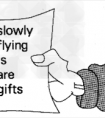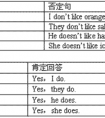用所给单词的适当形式填空。1.How(be)youtoday?2.Iknowyoulike(make)kites.3. I(write)apoemformymotheryesterday.4.John(live)nexttothepark.5.Amy(be)fromAmeric-六年级英语
题文
| 用所给单词的适当形式填空。 |
| 1. How (be) you today? 2. I know you like (make) kites. 3. I (write) a poem for my mother yesterday. 4. John (live) next to the park. 5. Amy (be) from America. 6. I (be) sorry to hear that. 7. My uncle (have) a new job there. 8. His ruler is (long) than mine. 9. I am (open) a present now. 10. He (play) the erhu last Sunday. |
答案
| 1. are 2. making 3. wrote 4. lives 5. is 6. am 7. has 8. longer 9. opening 10. played |
据专家权威分析,试题“用所给单词的适当形式填空。1.How(be)youtoday?2.Iknowyoulik..”主要考查你对 系动词,规则形容词的比较级,一般现在时,动词单数第三人称,现在进行时,现在分词,一般过去时,动词过去式 等考点的理解。关于这些考点的“档案”如下:
系动词规则形容词的比较级一般现在时,动词单数第三人称现在进行时,现在分词一般过去时,动词过去式
考点名称:系动词
- 系动词:
亦称连系动词,作为系动词,它本身有词义,但不能单独用作谓语,后边必须跟表语,亦称补语(形容词),构成系表结构说明主语的状况、性质、特征等情况。
be(是)是最基本的系动词。小学涉及到的系动词需要掌握的am, is, are
如:I am from Beijing. 我来自北京。
My mother is a teacher. 我的妈妈是一位老师。
除了系动词be,常用的系动词还有look(看起来)、sound(听起来)、feel(感觉到)、become(变成)、smell(闻起来)等。
例:The boy looks very happy. 这个男孩看起来很高兴。
The dish smells good. 这盘菜闻起来很香。 be动词意思和用法:
一般的意思是:
是,此种用法,有多种变化形式,is,am,are,was,were,being,been,to be.
另外,be动词还有成为的意思。
根据句子中不同的人称、数和时态,应该选择相应的be动词。<?xml:namespace prefix = "o" ns = "urn:schemas-microsoft-com:office:office" />要看句语的时态:
如果是一般过去时,就用was/were
如果是一般现在时,就用am/is/are
如果是一般将来时,就用will be
然后看主语的人称及复数形式:
一般过去时:
第一人称和第三人称的单数形式,则用was
第一人称和第二人称、第三人称的复数,则用were
一般现在时:
第一人称单数形式,用am
第三人称单数形式,用is
第一人称复数、第二人称、第三人称的复数形式,则用are
一般将来时:
will be
一般时态有关be动词的口诀:
我用am,你用are,is连接他/她/它,复数形式就用are
be动词的用法:
现在时 I am, you are, he is, we are, you are, they are
(缩略式 I'm, you're, he's, we're, you're, they're),
(否定缩略式 I'm not, isn't, aren't),
过去时 I was, you were, he was, we were, you were, they were
- 最新内容
- 相关内容
- 网友推荐
- 图文推荐
| [家长教育] 孩子为什么会和父母感情疏离? (2019-07-14) |
| [教师分享] 给远方姐姐的一封信 (2018-11-07) |
| [教师分享] 伸缩门 (2018-11-07) |
| [教师分享] 回家乡 (2018-11-07) |
| [教师分享] 是风味也是人间 (2018-11-07) |
| [教师分享] 一句格言的启示 (2018-11-07) |
| [教师分享] 无规矩不成方圆 (2018-11-07) |
| [教师分享] 第十届全国教育名家论坛有感(二) (2018-11-07) |
| [教师分享] 贪玩的小狗 (2018-11-07) |
| [教师分享] 未命名文章 (2018-11-07) |






